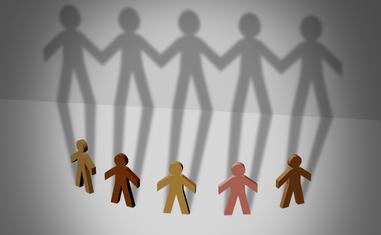The Bahá’í Faith, a global religion that emerged in the 19th century, emphasizes the fundamental oneness of humanity. Among its many tenets, the principle of abolition of prejudice serves as a crucial pillar upon which the Bahá’í community builds a more harmonious society. This principle not only advocates for the eradication of various forms of prejudice—be it racial, religious, gender-based, or class-related—but also presents a prophetic vision of a world unified in diversity. To explore this expansive theme, one might conclude that the teachings surrounding the abolition of prejudice act as both a guide for present conduct and an aspiration for future realization, akin to a lighthouse illuminating the path toward social harmony.
Historically, prejudice has been a pervasive ailment affecting societies around the globe. It manifests in myriad forms, creating divisions that hinder communal progress and undermine the integrity of human relationships. In contrast, Bahá’í teachings herald a narrative of inclusivity and understanding. The founder of the Bahá’í Faith, Bahá’u’lláh, posits that humanity is akin to a single body, wherein the discrimination among its members serves only to inflict wounds that weaken the entirety. This metaphor serves not only as a cautionary tale against societal disunity but also as an invitation to embrace the potential that lies in leveraging human differences for collective growth.
In the quest to abolish prejudice, Bahá’í teachings underscore the importance of education as a transformative power. Education is not merely an academic pursuit but a crucial fundament upon which societal values can be reshaped. The proliferation of knowledge and understanding acts as a formidable antidote to ignorance—a principal breeding ground for prejudicial attitudes. The Bahá’í community advocates for an educational framework that is inclusive, ensuring that diverse perspectives are acknowledged and appreciated. This approach is not solely about imparting information but rather an endeavor to foster critical thinking, empathy, and moral rectitude among individuals.
Furthermore, the Bahá’í principles regarding the abolition of prejudice resonate deeply within the modern context of globalization. In an era characterized by rapid exchange and interaction across cultural borders, the call to transcend narrow affiliations becomes even more urgent. The teachings articulate that prejudice acts as a formidable barrier to the establishment of a global civilization, one that champions mutual respect and camaraderie. The Bahá’í vision implores humanity to recognize that an individual’s worth is not determined by external factors such as race, gender, or creed, but rather by their intrinsic qualities and contributions to the collective well-being.
Yet, acknowledging the urgency of abolishing prejudice is merely the starting point; action is imperative. Bahá’í principles encourage active engagement in initiatives that promote social equality. Community-building efforts, dialogue among differing groups, and social action serve as vital conduits through which individuals can work together toward dismantling the structural inequalities that perpetuate discrimination. This proactive approach channels the innate desire for justice into tangible outcomes that reflect the foundational beliefs of the Bahá’í Faith.
Moreover, the Bahá’í teachings emphasize the prophetic aspect of the abolition of prejudice. This concept suggests a forward-looking vision wherein societies evolve towards greater inclusivity and understanding. Such a prophetic stance is invigorated by the belief that humanity is on a collective journey towards a more just and equitable world. Similar to a seed that requires nurturing to blossom into a thriving plant, the gradual cultivation of empathy and respect amongst individuals is deemed essential for realizing the ideal of a united global community.
The narrative of abolition of prejudice is intrinsically linked to broader themes of justice and equity in Bahá’í theology. This framework posits that the quest for justice can only be fulfilled when prejudice, as an impediment to fairness and equality, is eradicated. The Bahá’í concept of justice is multifaceted; it encompasses both individual moral rectitude and the institutional frameworks necessary for enforcing equity. The interplay between personal virtue and systemic change illustrates the complexity of addressing prejudice and invites individuals to partake in the transformation of both their inner selves and their communities.
The distinctions drawn between the different forms of prejudice—whether racial, religious, or social—further afford depth to the discourse on abolition. Each type of prejudice is interwoven into the fabric of society, shaping individual and collective identities in ways that can perpetuate segregation. Recognizing the particularities of these prejudices enables a more nuanced understanding of their origins and manifestations. Bahá’í teachings advocate for a discerning and compassionate approach, seeking to address the root causes rather than simply alleviating the symptoms of prejudice.
In essence, the teachings surrounding the abolition of prejudice present not just a noble principle but a prophetic vision for humanity’s future. As societies grapple with the complex and often fractious realities of coexistence, the Bahá’í Faith foresees a world wherein prejudicial barriers are dismantled, granting passage to a more united and equitable human family. Like a tapestry woven with diverse threads, the collective strength of humanity lies in its ability to incorporate the myriad differences that distinguish individuals while celebrating the shared essence of their humanity.
The journey toward the abolition of prejudice is arduous but illuminated by the hope that resides within collective action and the conscious cultivation of empathy. As individuals heed this call, they contribute to the overarching tapestry of a more inclusive world, one that is reflective of the highest ideals of justice and unity as envisioned by Bahá’í teachings.
